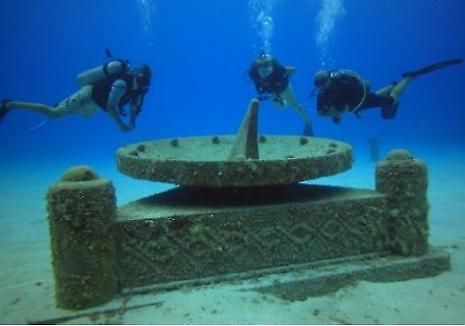Atlantis
I hadn’t originally planned to do a specific Atlantis thread, but during the time I was collecting data for the Cassiopaean timeline and Kantek threads, so much of the Atlantis information was mixed in I thought I should go ahead and put it into a thread of its own. I thought about comparing the C’s Atlantis material with that of Plato and Cayce, but since the Cassiopaean timeline project looks like it may provide a good comparative platform for that kind of information, I thought I would wait until it was up and then start adding it there. Below is the primary information I was able to gather and organize about Atlantis (with a bit about Lemuria as well):
Background
Lemuria
I assume the last reference is to the ‘Fall’ that occurred approximately 309,000 years ago. This seems too early for the end of Lemuria if the original Lemurians were Orientals (East Asians), but perhaps there is an explanation that I haven’t hit on yet.
Duration of Atlantis
We know that the three races of Atlanteans were the one we now know as ‘Native Americans’, the Paranthas (who have cousins along the edge of India and Southeast Asia, and in Papua New Guinea and Australia), and the Kantekkians (see
Population and Demography below). Although it is not explicitly stated, I also make the tentative assumption that the three incarnations of Atlantis were punctuated by the major cataclysms discussed later in the following way:
First incarnation of Atlantis
First cataclysm (Mars)
Second incarnation of Atlantis (perhaps now including Kantekkians? – see below)
Second cataclysm (Venus)
Third incarnation of Atlantis
Final cataclysm (crystals)
There are a couple of seeming discrepancies in the timeline for Atlantis, but these may only be apparent depending on what our assumptions are. The first discrepancy is between the durations given of 100,000 years versus 70,000 years. One hypothesis is that the 100,000-year duration marks the absolute beginning of the Atlantean civilization prior to the Kantek evacuation, whereas the 70,000-year duration marks the beginning of the period of Atlantis which included the evacuees from Kantek as the third Atlantean race. Since the Kantek evacuation occurred around 80,000 years ago (let’s say between 78,000 BC and 80,000 BC, approximately), this would mark the end of Atlantis at around 10,000 BC to 8,000 BC. The latter is close to the ‘Otto Muck’ date for the final breaking up of Atlantis, and it is also possible that the Atlantean civilization may have lasted longer than the ‘breakup’ of Atlantis itself.
The second apparent discrepancy is between the end dates for Atlantis – 12,388 BC for the ‘flood’, and 8498 BC for the ‘final breaking up’ of Atlantis. Looking at the wording closely, it seems that these two events are not necessarily the same. In fact, the first date may coincide with the second of the three cataclysms (caused by Venus), not the third (caused by crystals). See the
Destruction of Atlantis section below for more details.
Size and Location
To compare: this would be a bit less than half the size of Australia (2,970,000 square miles), or a bit larger than India (1,269,221 square miles).
Population and Demography
In general, it looks as though the Atlantean civilization covered most of the northern hemisphere, with the Paranthas generally in southern Eurasia, the Kantekkians in northern Eurasia once they established themselves after the evacution to Earth, and the 'Native Americans' occupying the area in between and also including the Americas. South America being the only place in the southern hemisphere (besides Antarctica, see below) that may be indirectly connected to Atlantis -- the other present-day continents such as Africa and Australia and their native populations are never mentioned in this context. As I mentioned in the Kantek thread, I have a working hypothesis that northeastern Eurasia (where Nostratic languages are primarily spoken but where there is a general Asian phenotype) was a place of intense contact between Kantekkians and the 'Native American' Atlanteans, although I haven't ruled out the possibility of Lemurian descendants being in the mix somehow as well.
Climate
Pre-Mars cataclysm
Post-Mars cataclysm
Karmic inheritance
Bear in mind that the Semites and the Jews are
not the same people, so when it is said above that the Semites had 'a significant role in the collapse of Atlantis', this isn't necessarily because of negative karma -- another interpretation is that they were one of the outside groups that fought against Atlantean tyrrany toward the end.
Science and Culture
Extraterrestrial travel
Destruction
Three cayaclysms
First cataclysm: Mars
Second catalysm: Venus
‘The Flood’
Third cataclysm: crystals
There seems to be some confusion regarding the role of Mars and Venus in the first and second cataclysms – in general it seems to be the case that Mars played the central role in the first cataclysm, whereas Venus did in the second, but one gets the impression that both planets were somehow involved in both instances.
Post-Destruction
Displaced Atlanteans
Post-Atlantean Sites
Finally, this is a list of sites and structures which have been asked about, and which post-date the destruction of Atlantis:
Lizard Sites
Mohenjo-Daro
Angkor Wat
Tiahuanaco
Oak Island
Nephalim-related sites
Baalbek
Easter Island
Human Sites
Stonehenge
Avebury
Pyramids
Chaco Canyon
Malta
As Corto Maltese points out below, this specific part about Malta may be inaccurate:
Cassiopaea Forum founded by Laura Knight-Jadczyk

www.cassiopaea.org
About the "drones", see
Science and Culture above.
Macchu Picchu
This date would actually make Macchu Picchu Atlantean, but I am listing it here for the sake of completeness.
Nazca Lines
Yonaguni
Damien in Kabul
Please feel free to post comments, questions or corrections!




